Wonder about Elizabeth's age at death in the Bible? Discover clues and contexts that shed light on this biblical mystery.

How Old Was Elizabeth in the Bible When She Died
While some might argue that the Bible doesn't explicitly state ages, making such discussions speculative, it's important to consider the clues and contexts that could lead to an educated guess about Elizabeth's age at her passing.
As you explore Elizabeth's biblical background and the miraculous birth of her son, John the Baptist, alongside the historical and scriptural cues, you'll uncover insights into the life expectancy of her time.
The theories of theologians and the timeline we piece together offer a fascinating glimpse into Elizabeth's legacy. Let's embark on this journey to uncover a part of biblical history that continues to inspire curiosity and debate.
Key Takeaways
- Elizabeth was well beyond childbearing years when she conceived John the Baptist, indicating she was of advanced age.
- The Bible does not explicitly mention Elizabeth's age at death, making it difficult to estimate with accuracy.
- Lifespan references in biblical passages suggest she lived into old age, especially considering the miraculous birth of her son.
- Given the lack of specific age details, Elizabeth's exact age at death remains a matter of interpretation and faith.
Elizabeth's Biblical Background
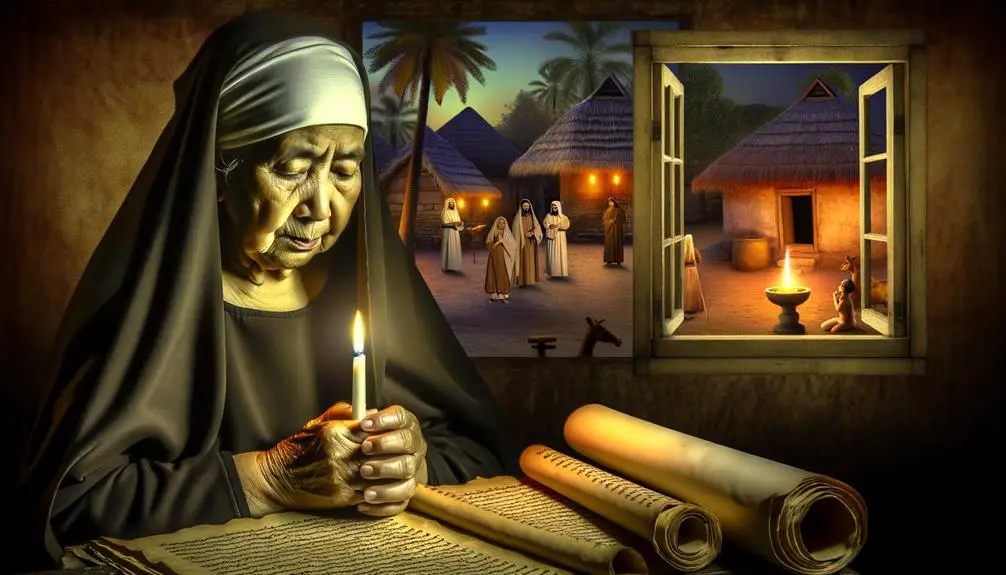
Elizabeth, the mother of John the Baptist, stands as a significant figure in Christian tradition, known for her faith and the miraculous circumstances surrounding her pregnancy. From Zacharias' perspective, her husband and a priest, the news of Elizabeth's pregnancy was met with disbelief, leading to his temporary muteness as a divine repercussion for his doubt. This aspect of their story highlights the tremendous faith required to embrace the unexpected, especially when it defies human logic and experience.
Your understanding of Elizabeth's narrative isn't complete without delving into Mary's visitation. When Mary, who was pregnant with Jesus, visited Elizabeth, it wasn't just a family reunion; it symbolized the intertwining of divine plans for both their sons. Elizabeth's reaction to Mary's arrival — feeling the baby leap in her womb and being filled with the Holy Spirit — underscores the prophetic role John the Baptist would play in heralding Jesus' ministry. This moment between the two women is pivotal, showcasing a mutual recognition of each other's part in a larger divine story.
Analyzing Zacharias' perspective and Mary's visitation within Elizabeth's story, you're offered a glimpse into the depth of faith and submission to God's will that characterizes these biblical figures. Elizabeth's life, marked by patience and belief in God's promises, serves as a profound example of faith in the face of improbability. Her story isn't just a backdrop to the narratives of John the Baptist and Jesus; it's a testament to unwavering faith and the power of God to work wonders in the lives of those who believe.
The Age of Miracles
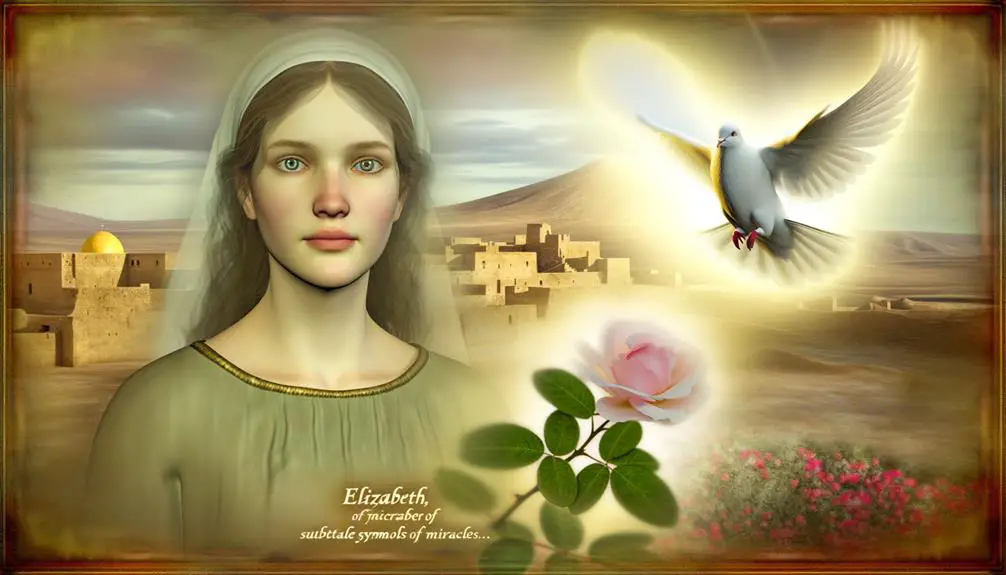
In exploring the narrative of Elizabeth's life, one can't help but marvel at the era she lived in, an age where miracles weren't just stories but tangible manifestations of faith and divine intervention. This period, saturated with miraculous events, offers a profound lens through which to view the power of belief and the extraordinary. Elizabeth's own story, marked by the miraculous conception of John the Baptist in her advanced years, underscores the theme of divine possibility against human impossibility.
You might find yourself pondering how this ancient narrative intersects with today's world. Modern parallels can indeed be drawn, though not necessarily in the form of supernatural occurrences. Instead, the essence of these miracles—hope, transformation, and renewed faith—finds resonance in countless contemporary experiences. Whether through unexpected recoveries from illness or sudden positive shifts in seemingly hopeless situations, the spirit of what many would label miraculous persists.
Moreover, Elizabeth's story invites rich faith discussions, encouraging a reevaluation of the miraculous in the modern context. It prompts questions about how we perceive divine intervention today and challenges us to recognize the miraculous in the everyday. Such discussions not only enrich individual faith journeys but also foster a deeper understanding of the multifaceted ways in which the divine can manifest in our lives.
Analyzing Elizabeth's life within the age of miracles provides a valuable perspective on the enduring nature of faith and the potential for the extraordinary, urging us to consider the presence and impact of the miraculous in our own times.
Historical Context

To fully appreciate Elizabeth's narrative and the age of miracles she lived in, it's crucial to delve into the historical context that shaped her world. You're stepping into a period deeply influenced by Roman occupation, a time when cultural practices and religious traditions were under the tight grip of an expansive empire. This backdrop is essential in understanding the daily life and challenges Elizabeth would have faced.
Living under Roman rule, Elizabeth's life was intertwined with the complexities of navigating a society where cultural practices from both Jewish traditions and Roman customs merged and sometimes clashed. The Roman occupation imposed taxes, laws, and a political structure that affected every aspect of life, from the smallest village to the largest city. This environment would have influenced Elizabeth's experiences, her faith, and her interactions within her community.
Moreover, cultural practices during this time were rich and varied. Family, religion, and community life played central roles. Elizabeth's story, including her miraculous pregnancy, is deeply embedded in these traditions. Her faith and the societal expectations of women, especially in bearing children, were significant factors in her narrative. Understanding these cultural practices helps you grasp the magnitude of Elizabeth's experience and the miraculous birth of John the Baptist in a more profound manner.
Clues From Scripture
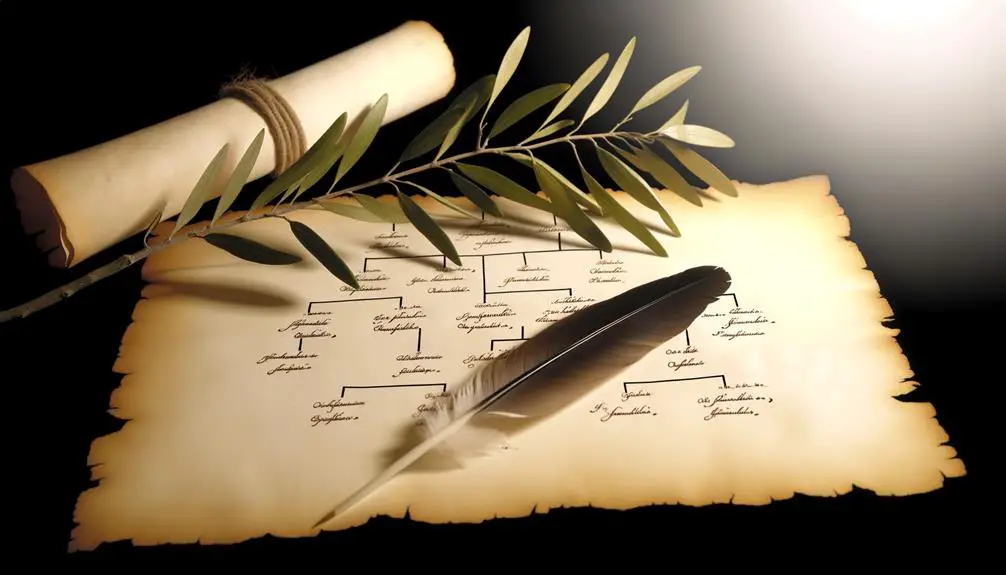
As you explore the biblical narrative, you'll find hints about Elizabeth's age and her lifespan within the text. By examining age indicators and scriptural references to lifespans, you gain insight into the context of her life and times.
Analyzing these biblical cues not only sheds light on Elizabeth's story but also enhances our understanding of historical life expectancies.
Elizabeth's Age Indicators
Scripture provides several clues regarding Elizabeth's age, suggesting she was well beyond childbearing years when she became pregnant with John the Baptist. The narrative surrounding Zacharias' silence is particularly telling. After expressing disbelief at the angel Gabriel's message, Zacharias was rendered mute, a period during which Elizabeth conceived.
This miraculous event underlines the extraordinary nature of her pregnancy, hinting at her advanced age. Furthermore, Mary's visitation to Elizabeth adds another layer. The joyous encounter between the two pregnant women, with Elizabeth in her later years, emphasizes the miraculous aspect of Elizabeth's condition.
These scriptural moments don't just highlight the miraculous births ahead but subtly indicate Elizabeth's age, painting a picture of a woman whom many would have considered past the age of motherhood.
Scriptural Lifespan References
Building on the understanding of Elizabeth's age as suggested by key events, let's examine the biblical passages that offer further insight into her lifespan. The Scriptures, while not explicitly stating Elizabeth's age at death, provide genealogical records and hints about mortality rates during her time. These clues help us piece together a more informed estimate of her lifespan.
Source |
Clue Type |
Relevance |
|---|---|---|
Luke 1 |
Genealogical records |
Offers background on Elizabeth's lineage |
Psalms |
Mortality rates |
Gives context on average lifespans |
Genesis |
Historical lifespans |
Provides benchmarks for ancient lifespans |
Analyzing these references within Scripture, you gain a deeper understanding of the typical lifespans during Elizabeth's era, aiding in estimating her age at the time of her passing with respect and accuracy.
Analyzing Biblical Context
Delving into the biblical context reveals clues about Elizabeth's age through genealogical records and historical benchmarks, providing a clearer picture of her lifespan.
You'll find that genealogical records, while not explicitly stating her age, give insight into her family lineage, shedding light on cultural practices that indirectly suggest possible age ranges.
By understanding these cultural practices, such as marrying age and childbearing norms, you can piece together a more informed guess about her age at death.
This method requires piecing together various hints scattered throughout scriptures and historical documents, making educated assumptions based on the societal norms of her time.
It's a respectful and analytical approach to uncovering details about Elizabeth's life that the Bible itself may not directly divulge.
Theologians' Theories
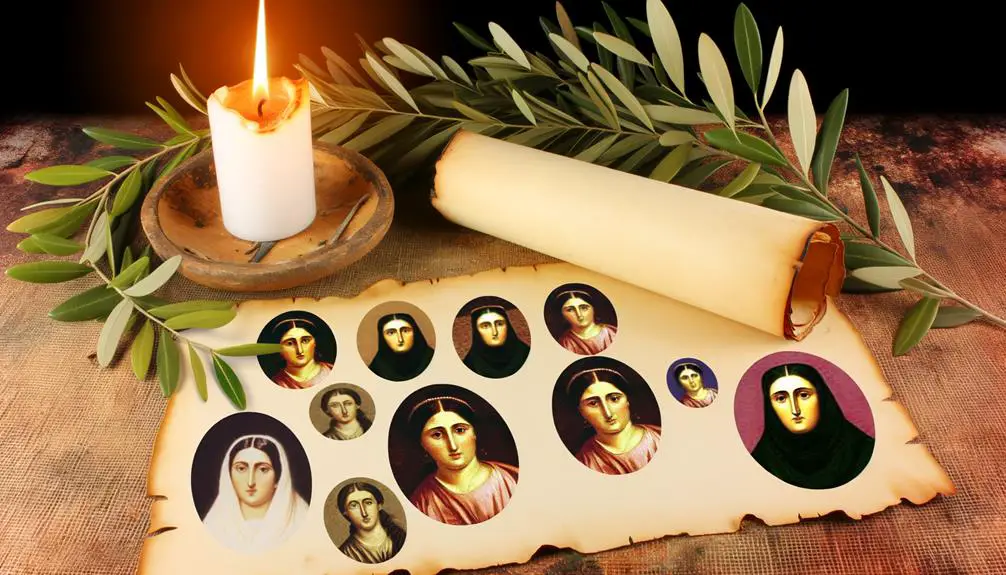
You'll find theologians have developed various theories to estimate Elizabeth's age at her death, drawing upon a rich tapestry of methods.
They've analyzed historical contexts alongside biblical lifespan comparisons, providing a nuanced understanding of her age.
These approaches, from age estimation techniques to historical analysis, offer insightful perspectives into Elizabeth's era and the biblical narrative.
Age Estimation Methods
While determining Elizabeth's age at her death remains a complex task, theologians have developed several estimation methods based on biblical texts and historical context. These scholars often turn to carbon dating and genetic analysis, though typically used in archaeological studies, to glean insights into the timelines and lifespans of biblical figures.
Carbon dating, for instance, can give a rough estimate of the age of artifacts associated with Elizabeth's time, providing a contextual backdrop for theologians to infer her possible age range. Similarly, genetic analysis, while less directly applicable, offers clues about the longevity and health conditions of populations during her era.
Together, these scientific methods complement traditional scriptural analysis, offering a more nuanced understanding of Elizabeth's life and times.
Historical Context Analysis
Beyond the scientific methods such as carbon dating and genetic analysis, theologians also explore Elizabeth's age through the lens of historical context, weaving together biblical narratives with the cultural and societal norms of her time to form theories on her lifespan. They delve into genealogical records and archaeological evidence, attempting to place her within the broader tapestry of history.
Source |
Contribution to Theory |
|---|---|
Biblical Narratives |
Offers chronological markers for analysis |
Cultural Norms |
Provides context for life expectancy |
Genealogical Records |
Traces familial lineage and ages |
Archaeological Evidence |
Supports historical accuracy of narratives |
These elements collectively guide theologians in constructing an informed theory regarding Elizabeth's age, respecting the limitations and opportunities presented by historical analysis.
Biblical Lifespan Comparisons
To understand Elizabeth's age at the time of her death, scholars often compare her lifespan to those of other biblical figures, analyzing patterns and deviations within these sacred texts.
Modern comparisons delve into the longevity of characters like Methuselah, who reached 969 years, contrasting sharply with Elizabeth's unspecified age. This analysis extends beyond mere curiosity, addressing age myths and their symbolic meanings within biblical narratives.
Through careful examination, theologians propose theories that contextualize Elizabeth's lifespan within the broader spectrum of biblical ages, suggesting that her age, while not explicitly stated, fits a pattern of divine purpose rather than literal interpretation. This approach respects the text's integrity, offering a nuanced understanding that bridges ancient stories with contemporary insights.
Life Expectancy Insights

Understanding life expectancy in biblical times offers valuable context when considering Elizabeth's age at her death. You'd find it fascinating to compare the health practices and life spans of that era with today's standards, where modern longevity has seen significant improvements. In the biblical period, the average life expectancy was much lower than what we witness now. This stark difference is largely due to advancements in medical science, nutrition, and general health practices that have evolved over centuries.
In Elizabeth's time, the concept of healthcare was vastly different. Basic hygiene practices, now considered fundamental, weren't well understood. Diseases that are easily preventable or treatable today could have been death sentences back then. Access to clean water and nutritious food wasn't as widespread, directly impacting people's longevity.
Moreover, the stress of daily survival in a largely agricultural and war-prone society could take a considerable toll on one's health. Despite these challenges, there were individuals who lived to what we'd consider a ripe old age, though these cases were more the exception than the norm.
Understanding this backdrop is crucial. It helps you appreciate the resilience and fortitude it required to live in those times. It also sheds light on how remarkable it was for anyone, including Elizabeth, to live into old age. This historical context underscores the significant strides humanity has made in health practices, contributing to the modern longevity we often take for granted.
Piecing Together the Timeline
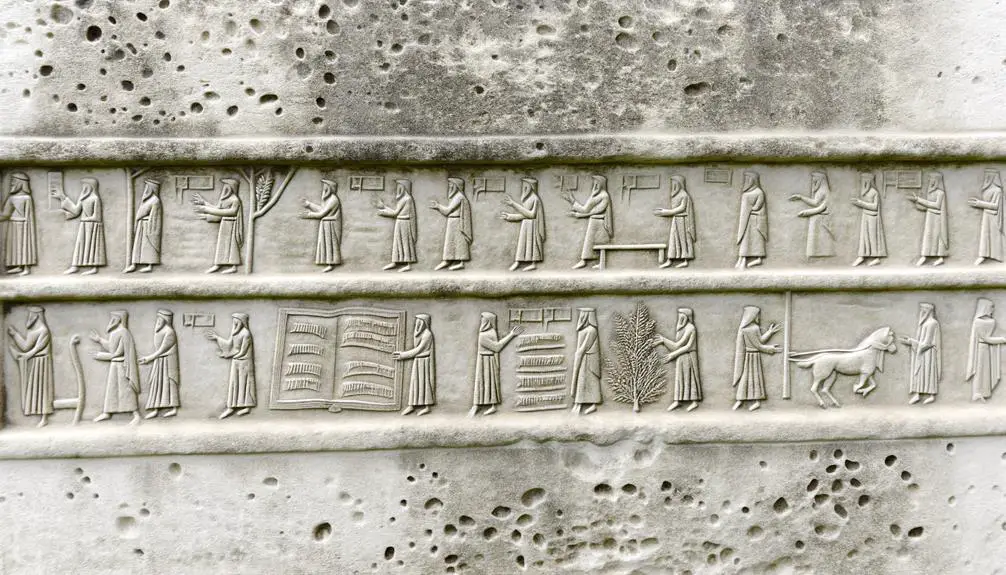
While the Bible doesn't provide explicit details regarding Elizabeth's age at her death, analyzing related scriptures and historical contexts can offer clues to approximate this timeline. You've learned about life expectancy insights, now let's delve into piecing together Elizabeth's timeline by examining genealogical records and cultural traditions.
Genealogical records in biblical times were meticulously kept, often preserved through oral traditions and later written texts. These records, while not providing direct information about Elizabeth, help us understand the lineage and familial ties of significant biblical figures, including her husband, Zechariah, and her relation to Mary, the mother of Jesus. By understanding the importance of lineage, you can appreciate the meticulous record-keeping that indirectly aids in piecing together Elizabeth's life span.
Cultural traditions of the time also shed light on Elizabeth's age. Women often married young, and Elizabeth's late pregnancy with John the Baptist is highlighted as a miraculous event, given her age. This cultural insight suggests that Elizabeth was well beyond the typical childbearing age, which, when combined with life expectancy of the time, suggests she lived a relatively long life for her era.
Elizabeth's Legacy and Age

Reflecting on Elizabeth's meticulously recorded lineage and the cultural traditions of her time offers insight into her age and the enduring legacy she left behind. While the Bible doesn't specify her exact age at death, understanding her era and the significant events in her life sheds light on her pivotal role in biblical history. Elizabeth's parenting of John the Baptist, amidst societal disbelief, underscores her faith and resilience. The significance of her miracle pregnancy not only transformed her life but also served as a beacon of hope and faith for many.
Elizabeth's legacy is multifaceted, encompassing her faith, the miracle of her late-in-life pregnancy, and her role in nurturing a key figure in Christian history. Her story is a testament to the power of faith and the impact of godly parenting, underlining the importance of believing in the seemingly impossible.
- Her unwavering faith in the face of societal skepticism illustrated the depth of her spiritual conviction, inspiring generations to hold steadfast in their beliefs.
- The miracle of her pregnancy served as a pivotal sign of God's intervention and the forthcoming salvation, touching hearts and evoking a profound sense of awe and wonder.
- Elizabeth's parenting of John the Baptist played a crucial role in preparing a prophet who'd herald the arrival of Jesus Christ, showcasing the lasting implications of nurturing and guidance.
Analyzing Elizabeth's age and her contributions offers a deeper appreciation for her role in biblical narratives. Her legacy, marked by faith, miracles, and impactful parenting, continues to resonate, illustrating the timeless nature of her story.
Frequently Asked Questions
How Did Elizabeth's Age at the Time of Her Death Compare to the Average Lifespan of Women in Her Community?
You're wondering how Elizabeth's lifespan stacked up against her peers'. Without modern healthcare or current nutrition trends, folks back then had shorter lifespans. Elizabeth's age at death, though not specified, likely mirrored or slightly exceeded her community's average due to her noteworthy status.
It's crucial to analyze this with respect, understanding the historical context significantly impacted lifespans, making direct comparisons to today's standards a bit challenging.
Are There Any Traditions or Legends Outside of the Bible That Offer Clues About Elizabeth's Age at Death?
You're diving into a mystery that's intrigued many: what do traditions say about Elizabeth's final years?
Beyond the Bible, tales of Elizabeth's miracles and insights from Zechariah's perspective shed light on her life's twilight.
Analyzing these legends, you'll find respect and admiration for her enduring faith.
While precise ages remain elusive, these stories enrich our understanding, hinting at a life marked by spiritual depth and resilience until her passing.
How Has Elizabeth's Story Influenced Modern Interpretations of Age and Fertility in Religious Communities?
Elizabeth's story significantly impacts modern interpretations of age and fertility in religious communities. It challenges social stigmas and reshapes beliefs around what's possible, especially with advances in modern medicine.
This narrative encourages a more open and supportive conversation regarding fertility issues, regardless of age, within these communities. It's a reminder that faith and science can coexist, offering hope and new perspectives on age-related fertility.
What Role Did Elizabeth's Family Lineage Play in Determining Her Status and Longevity in Biblical Narratives?
Elizabeth's family tree wasn't just a list; it was a tapestry of ancestral prestige, weaving her into the fabric of biblical history.
Her genealogy's significance bolstered her status, giving her a storied place among narratives of faith and miracles.
You're looking at a lineage that elevated her, not just in societal ranks but in spiritual narratives, too.
This background didn't just hint at longevity; it underscored her pivotal role, making her story resonate through ages.
Can Archaeological Findings or Historical Records From the Time Period Provide Any Additional Insights Into the Typical Lifespan of Individuals Like Elizabeth?
Archaeological methodologies and historical records can indeed shed light on lifespan trends during Elizabeth's era. These tools allow you to understand the broader context of life expectancy, health conditions, and societal norms of that time.
Conclusion
In piecing together Elizabeth's timeline, you've journeyed through biblical backgrounds, miracles, and theological debates.
Considering life expectancy of her era and scriptural hints, it's clear her age remains a blend of history and mystery. Scholars speculate, yet specifics elude.
Elizabeth's legacy, however, transcends numbers; it's a testament to faith and divine intervention.
Whether young or old at her passing, her story inspires across ages, reminding us that faith's power and purpose defy time's constraints.



Sign up